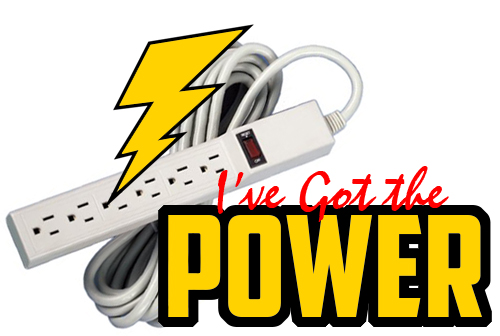
Ah, electricity. What would life be like if good ol’ Benjamin Franklin wasn’t so willing to get struck by lightning? Maybe it didn’t happen quite like that, but his findings have enhanced our lives in so many ways it’s hard to imagine life without it. Obviously, in our little area of the world, electricity is crucial for computers. Surprisingly to some, it’s not as simple as just plugging your computer into the wall and firing it up. There are things to consider which make the world of computing more stable and more productive in our daily lives. Learn how you too can have the power!
The very least that should be done, the bare minimum if you will, is to purchase a surge protector (power strip) for your computer. There are all kinds of power strips on the market with varying numbers of outlets, and some even offer ports for phone lines. If a computer is plugged into the wall and there’s a power surge or “brown out” there’s nothing to “cushion the blow” so to speak, and the computer will take the hit of the sudden change in electrical current. Any number of (bad) things can happen, from a blown power supply to a fried motherboard. If the power supply is taken out you’ll be calling us. If the motherboard goes bad you’ll be calling HP for a new computer. A power strip is an excellent investment if you consider the alternative!
If a power strip is the minimum, what’s the best way to power as well as protect your computer? The ultimate best way in my experience is with a UPS, no, not the big brown truck, an uninterruptible power supply. An uninterruptible power supply is the best of both worlds. It offers multiple outlets for all the needed cords that accompany a computer station, and it conditions the current in your house so it delivers consistent electricity to your expensive components. These aren’t cheap mind you, but you get what you pay for! The very best ones have a battery back-up as well which will offer a period of time (usually around fifteen minutes) that you can use a computer after the power has gone out. This is especially helpful if you’re in the middle of a document and need to save your work before shutting the computer down. After saving, utilize that time to shut the computer down completely to ensure that it won’t shut down on its own and damage any components.
It’s important to practice good, safe, powering habits even with this protection. If you ask ten people whether or not you should shut your computer down daily you’ll probably get ten different answers. Personally, I shut my computers as well as monitors down every night. I feel things just work better after shutting them down. I don’t have any scientific basis for this part, but I liken it to sleeping at night. Sleep resets our bodies and we work better. In my opinion, devices work better if they also rest. Your mileage may vary. Anyway, at the very least, make sure to shut the computer down when there’s bad weather in the area. Always do it properly and don’t just hold the power button down. That’s always asking for trouble.
As Voltaire once said, “With great power comes great responsibility.” Since he died in 1778 he wasn’t specifically talking about our technological devices, but the concept still applies today. There is great power flowing through the electrical current in our homes and businesses. If we harness this power we can use it to our advantage and safely power our computers again and again. I’ve got the power, do you?
